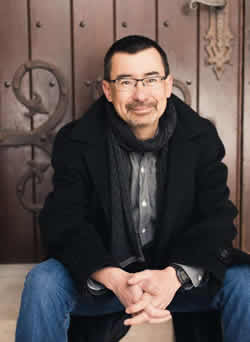Peter Ho Davies

|
Peter Ho Davies is the author of two novels, The Welsh Girl (long-listed for the Man Booker Prize and short-listed for The Galaxy British Books Awards), and, most recently, The Fortune; and two short story collections, The Ugliest House in the World and Equal Love. His short stories have been widely published and have been included in Prize Stories: O. Henry Awards 1998 and several Best American Short Stories anthologies, and he is the recipient of fellowships from the Guggenheim Foundation and the National Endowment for the Arts, and a winner of the PEN/Malamud Award. Born in Britain to Welsh and Chinese parents, he now makes his home in the US, and teaches in the MFA Program in Creative Writing at the University of Michigan in Ann Arbor. peterhodavies.com/author |
|
photo credit: Dane Hillard Photography |
On Form |
 |
|
Because I've been a short story writer for the majority of my career, I feel that one of the advantages, one of the pleasures of the form, is to be able to write a different story every time you sit down to work on a new piece of fiction. And one of the attractions of the form of a collection is that you can range rather wildly story by story across its length. You are not limited in voice, in time, in place, in style, in effect, or tone. So there's an aesthetic pleasure. In Flaubert's Parrot, Barnes talks about his character's admiration for Flaubert and the fact that Flaubert was a writer who never wrote the same book twice. I like that. Who has the time to write the same story twice? I'm not taking a long career for granted necessarily. So once you've done the best you can with something, why would you replicate it? That, I suppose, takes me from the aesthetic pleasure in variation to the very practical one. When you publish your first story, it becomes a touchstone, a place of confidence, something you go back to in grim moments and you think, "At least I could do that." But then everything you write afterwards, for a little while, you compare to that thing. The first draft of the new story always sucks compared to the last draft of the old story. That sense of competing with yourself can be kind of crushing, even overwhelming. I published my first story when I was twenty-one and I didn't publish my next story until I was twenty-six. This was for a variety of reasons, but one of them at least was that I was trying to write the same story again. Yet every effort to that end would seem to fall short. What I eventually learned was to stop trying to do the same thing. It helped me deal with that sense of competition with myself. So if the last story was very serious, why shouldn't the next one be comic? By changing the framework, changing the terms of comparison, the stories become incommensurable. You can thereby freeze that internal critic, that internal voice of judgment. Peter Ho Davies was interviewed by Jeremiah Chamberlin who teaches at the University of Michigan. His fiction and nonfiction have appeared in Glimmer Train Stories, The New York Times Book Review, Poets & Writers, Flyway, The Michigan Quarterly Review, Vagabond, and elsewhere. He is the Associate Editor of Fiction Writers Review. |
|
